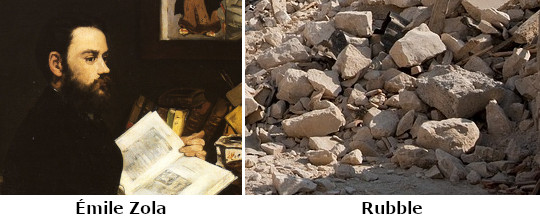Émile Zola? Apocryphal?

Question for Quote Investigator: The prominent French novelist and journalist Émile Zola has been credited with an inflammatory anti-clerical statement. Here are three versions in English:
- Civilization will thrive only when the last stone, from the last church has fallen on the last priest.
- Civilization will not attain perfection, until the last stone from the last church falls on the last priest.
- Humanity will not fulfill its true potential until the last stone from the last church falls on the last preacher.
Would you please explore the provenance of this remark?
Reply from Quote Investigator: Émile Zola’s 1901 novel “Travail” contains a scene during which the last church collapses on top of the last abbot. Here is a rendering of the dramatic event in English. Emphasis added to excerpts by QI:1
The roof cracked open with a sound like thunder. The steeple shook, and then fell, laying the nave open to the sky, and pulling down with it the disjointed walls. Nothing remained under the bright sun but an enormous pile of stones and débris, beneath which they never found the mangled body of Abbé Marle, who seemed to have been crushed to dust under the ruins of the altar. Nor did they ever find any fragments of the great painted and gilded wooden crucifix, which also had been ground to powder. A religion had been killed along with the last priest, celebrating his last mass in the last church.
QI has not yet found solid evidence that Zola crafted the expression under analysis. Perhaps someone who read “Travail” constructed the statement to represent the attitude depicted within the novel. Next, the words were directly reassigned to Zola. This two-step process provides an admittedly speculative explanation for the existence of the quotation.
Émile Zola died in 1902. The first strong match for the quotation located by QI occurred in the 1930 citation listed further below.
Here are additional selected citations in chronological order.
The French edition of “Travail” contained this corresponding passage:2
La voûte se fendit comme sous un coup de foudre, la toiture s’écroula dans tourbillon de débris avec un effroyable grondement de tonnerre. Ebranlé, le clocher oscilla, s’abattit à son tour, achevant d’éventrer la nef, entraînant le reste des murailles disjointes. Et il ne demeura rien sous le clair soleil, qu’un tas énorme de gravats, dans lequel on ne retrouva même pas le corps de l’abbé Marle, dont les poussières de l’autel écrasé semblaient avoir mangé la chair et bu le sang. Et l’on ne retrouva rien non plus du grand Christ de bois peint et doré, foudroyé lui aussi, tombé en poudre. Une religion encore était morte, le dernier prêtre, disant sa dernière messe, dans la dernière église.
In 1930 the atheism proponent Joseph Wheless published the book “Forgery In Christianity: A Documented Record of the Foundations of the Christian Religion” which included the first instance of the quotation located by QI:3
It remains yet to complete the good work for civilization and humanity by destroying the last lingering works and delusions of decadent and decayed priestcraft; through the universal triumph of Rationalism to fully and finally Ecraser l’Infame. Truly and prophetically spoke Zola: “Civilization will not attain to its perfection, until the last stone from the last church falls on the last priest!”
In 1945 the collection “What Great Men Think of Religion” compiled by Ira D. Cardiff included this entry:4
EMILE ZOLA, Contemporary French Author
Civilization will not attain to its perfection, until the last stone from the last church falls on the last priest!
In 1959 a columnist in Pasadena, California printed a different phrasing of the saying which had been supplied by a correspondent:5
In the words of Emile Zola, ‘Civilization will thrive when the last stone from the last church falls on the last priest.’
In 1992 “The Heretic’s Handbook of Quotations” edited by Charles Bufe included an instance matching the 1930 citation with the same attribution.6
In conclusion, Émile Zola published a novel in 1901 called “Travail” containing a fantastical scene during which a church collapsed on an abbot heralding the end of the church’s religious system. QI conjectures that the quotation evolved from that climactic scene. Currently, the earliest citation for the quotation is dated 1930 when it appeared in English. Of course, it is still possible that Zola directly employed the expression, but researchers have not yet been able to find supporting evidence.
Image Notes: Portrait of Émile Zola circa 1868 by Édouard Manet at the Musée d’Orsay. Picture of rubble caused by an earthquake from Angelo_Giordano at Pixabay.
Acknowledgement: Great thanks to Rob whose inquiry led QI to formulate this question and perform this exploration.
Update History: On April 10, 2025 the format of the bibliographical notes was updated.
- 1901, Travail: Labor: A Novel by Émile Zola, Quote Page 542, Harper & Brothers, New York. (Google Books Full View) link ↩︎
- 1901, Travail by Émile Zola, Quote Page 567, Bibliothèque-Charpentier, Paris. (Google Books Full View) link ↩︎
- 1930, Forgery In Christianity: A Documented Record of the Foundations of the Christian Religion by Joseph Wheless, Quote Page 406, Alfred A. Knopf, New York. (Internet Archive archive.org) ↩︎
- 1945 Copyright, What Great Men Think of Religion by Ira D. Cardiff (Ira Detrich Cardiff), Quote Page 427, The Christopher Publishing House, Boston, Massachusetts. (Verified with hardcopy) ↩︎
- 1959 November 5, Pasadena Independent, Ray McConnell’s Notebook, Quote Page 2, Column 1, Pasadena, California. (Newspapers_com) ↩︎
- 1992, The Heretic’s Handbook of Quotations: Cutting Comments on Burning Issues, Edited by Charles Bufe, Expanded Edition, Quote Page 183, Column 2, Sharp Press, Tucson, Arizona. (Verified with scans) ↩︎